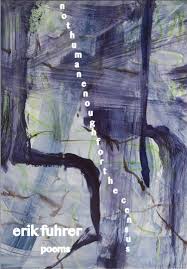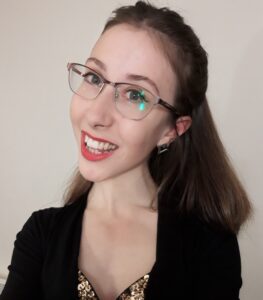Review by Isabelle Kenyon
 Not Human Enough for the Census
Not Human Enough for the Census
By Erik Fuhrer
$16.66
Vegetarian Alcoholic Press
Erik Fuhrer nearly started out going to art school, but wound up going down the writing route in college and became a poet instead. It follows, then, that his poetic works are intrinsically linked with visual art.
In this collection, Fuhrer collaborates with artist and partner, Kimberly Androlowicz, to create a book which delves deep into the human condition and allows us to reflect on our connection within the wider scheme of nature.
Fuhrer’s work connects with the Ekphrasis tradition as he observed Kimberly’s work and created poetry from that stimulus. We are introduced to scale early in the collection:
which ends up amounting to the number of hairs that are on the stomach of a
tick
whose legs crick against the shadow
created by my tethered teeth
you see
they don’t want me to bite anymore
Fuhrer begins to intertwine humanity and nature and highlight the two as intrinsically linked. The idea of what is human and what is the nature of the tick become blurred. Perhaps it is humanity who have become the parasites of the earth? Fuhrer writes, “there is a nightmare growing inside you” from which we cannot seem to escape. Do we create our own nightmares? In between the gaps of what Fuhrer does not say, the reader begins to ask questions of their own.
Indeed, in a world plagued by COVID19, suffering from the increasing devastating effects of global warming, it becomes even more relevant to reflect on concepts such as survival of the fittest. Fuhrer writes,
let’s face it
the only future is fiction
and the present is only
a panel of three
that decides our fate
as a species
Perhaps this time the human race cannot control the judging power of this panel. Perhaps our fate is increasingly sealed. While the seemingly random process of the human race’s survival is described in this cynical manner, I can’t help but reflect on its truths and the downward spiral of thought which Fuhrer indulges in.
As the collection progresses, we turn to look at human experiments and scientific progression –
[lab report]
under consideration:
gills
tracheas
- freud’s left molar
whale droppings
the answer is not:
crab teeth
owl pincers
it does not include the universe
the answer has the heart of a black hole
leave it the fuck alone
there will be
solitary confinement
for the correct answer
Fuhrer seems to lament the animal kingdom which we use for our personal gain. Where do we draw the line with scientific advancement? When do humans hold their hands up and say that experimentation has gone too far? Perhaps the human race does not need to answer all of the universe’s questions.
As well as scientific advancement, it is our everyday destruction of nature’s habitats which will ultimately be our downfall:
and the squirrels
bit off their broken branches
trying to save their homes
in the treebutchers mouths
to no avail
the apocalypse came as a treebutcher slicing
down the petrified trees with its teeth
Ultimately the earth’s natural resources are not given time to recover.
The squirrel roots us to what we currently regard as an everyday animal, but by personifying the squirrel’s peril, and indeed of the forest, Fuhrer encourages a reader out of this complacency. The word ‘apocalypse’ suggests total devastation, but perhaps Fuhrer wants to communicate his reader that we are already at this level of extreme devastation without realizing its true extent. Overall, this collection refreshingly provides more questions than answers, gently pointing us towards crimes against nature.
This book is worth a read if you are interested in the boundaries of poetry – how to manipulate language and experiment with form on the page. Similar works by Fuhrer that intertwine artworks and poetry include VOS (Yavanika Press, poems and interior collages by Erik Fuhrer) and At Root (Alien Buddha Press, poems and interior art by Erik Fuhrer, a minimalist erasure of Samuel Beckett’s Waiting for Godot.)
 Isabelle Kenyon is the author of This is not a Spectacle, Digging Holes To Another Continent (Clare Songbirds, 2018), Potential (Ghost City 2019), Growing Pains (Indigo Dreams, 2020) and one short story with Wild Pressed Books (‘The Town Talks’, 2020). She is the editor of Fly on the Wall Press.
Isabelle Kenyon is the author of This is not a Spectacle, Digging Holes To Another Continent (Clare Songbirds, 2018), Potential (Ghost City 2019), Growing Pains (Indigo Dreams, 2020) and one short story with Wild Pressed Books (‘The Town Talks’, 2020). She is the editor of Fly on the Wall Press.